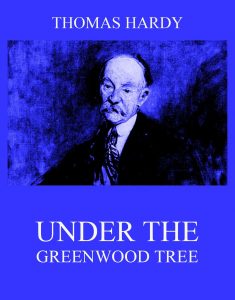Under The Greenwood Tree – Thomas Hardy
“Under the Greenwood Tree” is a year-long rural idyl. The nine chapters of the first part entitled “Winter,” are taken up with a wonderfully humorous description of the old-fashioned wind-instrument choir of the parish of Mellstock trudging around on Christmas night to serenade every dweller in the parish, and with an equally humorous description of the party given by honest Reuben Dewey, the tranter, or wagoner. The other parts, named after the other seasons, commemorate the love of Dick Dewey, the tranter’s son for Fancy Day, the village schoolmistress—a love which ends in the most typical of rural weddings, in spite of the fact that the young rector himself is somewhat smitten with the fair schoolmistress who plays the first organ set up in the parish church. The despair of the old choir at the advent of this organ and their visit to the rector in expostulation are described with a humor that puts Mr. Hardy alongside of Dickens if not, as some think, above him.
Format: Paperback.
Under The Greenwood Tree.
ISBN: 9783849674090.
Available at amazon.com and other venues.
Plot summary of Under the Greenwood Tree (from Wikipedia):
The plot concerns the activities of a group of church musicians, the Mellstock parish choir, one of whom, Dick Dewy, becomes romantically entangled with a comely new school mistress, Fancy Day. The novel opens with the fiddlers and singers of the choir—including Dick, his father Reuben Dewy, and grandfather William Dewy—making the rounds in Mellstock village on Christmas Eve. When the little band plays at the schoolhouse, young Dick falls for Fancy at first sight. Dick, smitten, seeks to insinuate himself into her life and affections, but Fancy’s beauty has gained her other suitors, including a rich farmer and the new vicar at the parish church.
The vicar, Mr. Maybold, informs the choir that he intends Fancy, an accomplished organ player, to replace their traditional musical accompaniment to Sunday services. The tranter and the rest of the band visit the vicar’s home to negotiate, but reluctantly give way to the more modern organ. Meanwhile, Dick seems to win Fancy’s heart, and she discovers an effective strategem to overcome her father’s objection to the potential marriage. After the two are engaged secretly, however, vicar Maybold impetuously asks Fancy to marry him and lead a life of relative affluence; racked by guilt and temptation, she accepts. The next day, however, at a chance meeting with the as-yet-unaware Dick, surprised Maybold learns from him of his engagement to Fancy. The vicar follows by prompting her by letter, while expressing being taken aback by such news, to be honest to Dewy and withdraw her commitment to him if she indeed intended to become married to Maybold. Fancy responds by withdrawing her consent to marry Maybold and asking him to keep her initial acceptance of his proposal forever a secret. Maybold replies by urging her again to be honest with Dick and admit she accepted the vicar despite having already committed herself to the young tranter, assuring her she would be forgiven. However, as she marries Dewy who is so in love he readily dismisses what he previously (rightly) considered exhibits of her fickleness and rejoices at what he perceives at the prospect of a happy union based on honesty, given Fancy’s effusive and seemingly frank admission to some (minor) infidelities, while he assumes they would never keep any secrets from each other, she resolves never to disclose the truly incontrovertible and damning evidence against her character in her having so readily accepted Maybold despite her engagement to Dewy.
The novel ends with a humorous portrait of Reuben, William, Mr. Day, and the rest of the Mellstock rustics as they celebrate the couple’s wedding day. The mood is joyful, but at the end of the final chapter, the reader is reminded that Fancy has married with “a secret she would never tell” (her final flirtation and brief engagement to the vicar). While Under the Greenwood Tree is often seen as Hardy’s gentlest and most pastoral novel, this final touch introduces a faint note of melancholy to the conclusion.
(The text of the last section was taken from a Wikipedia entry and is available under the Creative Commons Attribution-ShareAlike License.)
Publisher’s Note: This book is printed and distributed by Createspace a DBA of On-Demand Publishing LLC and is typically not available anywhere else than in stores owned and operated by Amazon or Createspace.

